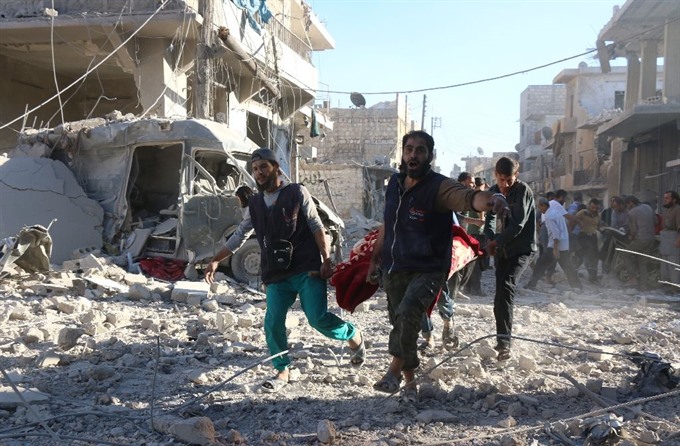 World
World

Russia said Tuesday it has sent an advanced missile system to the Syrian port of Tartus, as tensions escalate between Moscow and Washington over the five-year conflict.
 |
| Aleppo is reeling from some of the most brutal fighting in the five-year Syrian conflict.—AFP/VNS Photo |
ALEPPO – Russia said Tuesday it has sent an advanced missile system to the Syrian port of Tartus, as tensions escalate between Moscow and Washington over the five-year conflict.
The announcement came after Washington said it was suspending talks with Moscow aimed at reviving a ceasefire deal over Russia’s support for the regime of Syrian President Bashar al-Assad.
On the ground, Assad’s forces advanced on rebels during intense street fighting in the opposition-held east of Aleppo city, which Russia has been accused of bombing indiscriminately including targeting its hospitals.
The UN rights chief called for action to halt the "ghastly avalanche of violence" unfolding in Syria’s second city, which is reeling from some of the most brutal fighting in the conflict.
Russia, which has denied its strikes have hit hospitals, said it was deploying an S-300 missile system to Tartus on the Mediterranean coast.
"The S-300 is a purely defensive system and poses no threat to anyone," said defence ministry spokesman Igor Konashenkov.
"It’s not clear why the placement of S-300 in Syria has caused such a stir among our western colleagues," he said in a statement.
Pentagon spokesman Peter Cook said the Russian missile system would not affect operations in the US-led air campaign against the Islamic State group in northern Syria, and questioned why Moscow was making the move.
"Last I checked, the Russians said that their primary goal was to fight extremism, ISIL and Nusra, in Syria," he said, referring to IS and another group formerly known as Al-Nusra Front.
"Neither one has an air force... So this is something we’ll watch carefully. But it should be clear to the Russians and everybody else operating in Syria how seriously we take the safety of our air crews."
As well as operating a naval facility in Tartus, Russia runs an air base outside the Syrian coastal city of Latakia, which currently houses warplanes used in its bombing campaign in support of ally Assad.
In August, a Russian official said Moscow was planning to expand into a permanent military facility its Hmeimim air base, which already has an S-400 air defence system, its most modern equipment.
Washington announced late Monday that it would suspend joint efforts to reinstate a nationwide truce, accusing Moscow of abetting Assad’s assault on Aleppo.
’Patience has run out’
"Everybody’s patience with Russia has run out," said White House spokesman Josh Earnest.
A US official said Secretary of State John Kerry was focused on finding a diplomatic solution, but his talks with Russian counterpart Sergei Lavrov on the crisis were over.
US security and foreign policy chiefs were set to meet Wednesday to discuss "diplomatic, military, intelligence and economic options" ahead of a meeting with President Barack Obama, a State Department spokesman said.
"Just because we’ve temporarily suspended the cooperation that we had bilaterally with Russia on Syria doesn’t mean that we’ve closed any doors on multilateral action," Mark Toner added.
The Kremlin said it "would like to hope for the presence of political wisdom and the continuation of exchanges on particularly sensitive issues that are necessary for maintaining peace and security."
The US-Russia truce plan had envisioned an end to hostilities, increased aid deliveries, and eventual coordination in the fight against jihadists.
But it collapsed after a week, with Russia blaming Washington for failing to convince rebels to distance themselves from jihadists.
Russia and the US will keep a communications channel open solely to ensure their separate anti-jihadist bombing campaigns do not get in each other’s way.
The Syrian army announced a major Russian-backed military push nearly two weeks ago to capture the eastern half of Aleppo, once the country’s commercial hub.
’Avalanche of violence’
The regime forces were "gradually advancing" after street battles on the front line dividing the city, said the Syrian Observatory for Human Rights.
State media said rebel shelling on the government-held west, including the Aleppo University campus, killed six people.
More than 300,000 people have been killed since the conflict erupted in March 2011, and the latest attempt at securing a diplomatic solution to the war has fallen apart.
UN rights chief Zeid Ra’ad Al Hussein decried the "ghastly avalanche of violence and destruction" in east Aleppo, saying 100 children had been killed in the past 10 days.
He urged the Security Council to introduce a limit on its members’ veto power, to prevent countries like Russia blocking the referral of Syria’s conflict to the International Criminal Court in The Hague.
On Monday, the largest hospital in the rebel-held side of Aleppo was completely destroyed in an aerial attack, according to the Syrian American Medical Society, which supports the facility.—AFP




